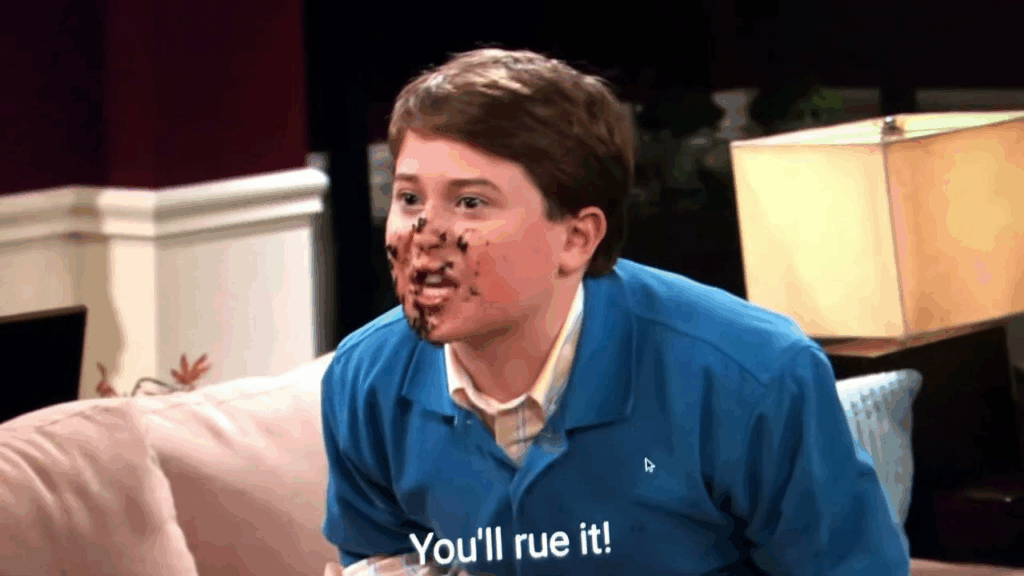Remember that awful feeling when you said something hurtful in anger and instantly wanted to take it back? Maybe you zapped your little brother’s favorite toy with the nerf gun, or told your best friend their new haircut looked weird. That gut-punch of regret? That’s exactly where “rue the day” comes from. Most people hear this phrase in scary movie threats but have zero clue what it *really* means. Today we’ll unpack this dusty old expression, discover why it still gives us chills, and learn when to actually use it (spoiler: not when your mom catches you eating cookie dough straight from the tub).
Etymology and Historical Evolution

Old English hreowan means “make someone sorry, cause to grieve, distress, affect with regret.” Imagine medieval villagers after a bad harvest—you’d rue the day winter came early. This word didn’t just pop out of nowhere; it traveled through languages like a linguistic backpacker. Way back in Proto-Germanic, *khrewan* meant “to sadden or cause repentance.” Cool fact: While “rue” sounds like the Mediterranean ruta herb (which heals wounds), they’re totally unrelated—English irony at its finest!
By Middle English, people spelled it “reue” or “rewen” while whispering about regrets. Shakespeare totally vibed with this word, using “rue the hour” in King John around 1595. But the real showstopper? Christopher Marlowe’s Tamburlaine the Great (1587) with the line, “I’ll make you rue the day that e’er you saw me.” Talk about setting the mood for every villain speech since!
Modern Usage
The phrase “I’ll make you rue the day” remains a standard threat phrase in English storytelling. You’ve definitely heard it when the bad guy corners the hero in cartoons or TikTok skits. But here’s the twist: nobody actually says “I rue the day” in real life like they’re in a Shakespeare play. It’s mostly used ironically now—like when your friend eats the last slice of pizza and you joke, “I will rue this day when I’m hangry later.”
Pop culture keeps it alive though. Remember when Ramsay Bolton told Theon Greyjoy, “You will rue the day you ever crossed me” in Game of Thrones? Or Bruce Lee’s famous quote: “Empty your mind, be formless… now you will rue the day you met me.” (Okay, he didn’t actually say that part—but fans imagine it!) Modern examples are rare outside movies, which is why so many folks scratch their heads over “what does rue the day mean.”
“Rue” vs “Regret” and Other Idioms
Penitence defines the deep remorse associated with “rue” that sets it apart from everyday regret. Think of it like this: You regret eating broccoli, but you’d rue selling your grandma’s heirloom necklace for candy money. Rue implies heart-crushing sorrow—you’re not just “oops sorry,” you’re lying awake at 3 a.m. bawling.
Other phrases capture similar feels but with different vibes:
- “Cry over spilt milk”: For small, pointless regrets (like your little brother’s spilled juice)
- “Bite your tongue”: When you wish you’d stayed quiet (too late!)
- “Eat your words”: When you’re forced to admit you were wrong (super awkward)
My favorite example? My cousin Zoe deleted her ex’s number… then accidentally texted him a duck-face selfie. She i rue the day I let my thumb slip!” she screamed. (True story—we still tease her about you will rue the day whenever she uses emojis.)
Cross-Linguistic Perspective
German Reue means “repentance, regret, remorse, contrition” as a direct linguistic cousin. It’s fascinating how other languages package this heavy emotion:
| Language | Word | Literal Vibe |
|---|---|---|
| Scots | rew | “Oof, my heart aches” |
| Old Norse | hryggja | “Grief that sticks in your throat” |
| Spanish | lamentar | Formal regret (like in telenovelas!) |
No exact “rue the day” equivalent exists globally. French speakers say “tu le regretteras” (you’ll regret it), but it lacks the dramatic doom of English. Japanese has “ima made shita koto o uramu“—which roughly means “I curse what I’ve done”—but it’s way too intense for misspelling your name on a test!
The query “what does rue mean” ranks among top searches for confused language learners. Let’s clear the fog:
“My teacher said ‘rue’ isn’t just ‘regret’—how’s it different?” — Mateo, 13
Conclusion
Shakespeare’s influence extends to popularizing regretful phrases like “rue the day” in English. While nobody buys “rue the day” t-shirts, understanding this phrase is like unlocking secret levels in language history. Next time someone threatens, “You will rue the day!”—just smile and say “Cool story, but what’s you will rue the day meaning really?” (Then explain Proto-Germanic when they blink in confusion.) Remember: true rue lives in moments that change your life, not burnt toast. So maybe don’t rue the day you clicked this article… unless you’re still confused. (You’re not, right?)
P.S. My i rue the day I tried to dye my hair blue before picture day still haunts me. Choose wisely, friends.

